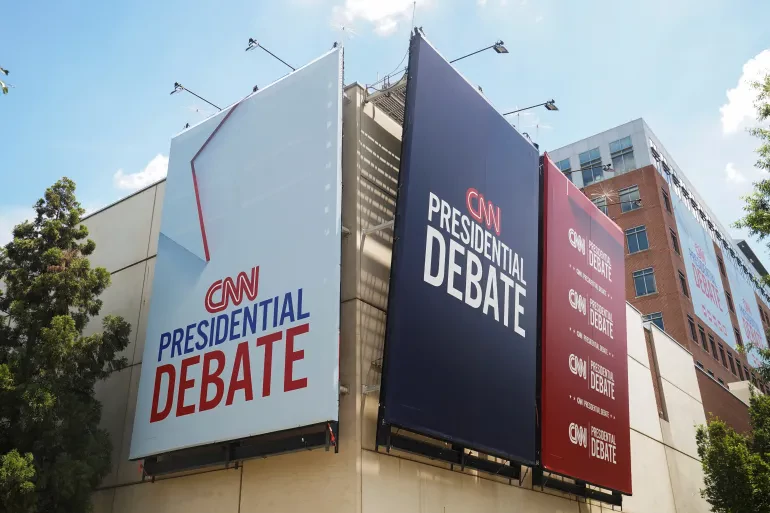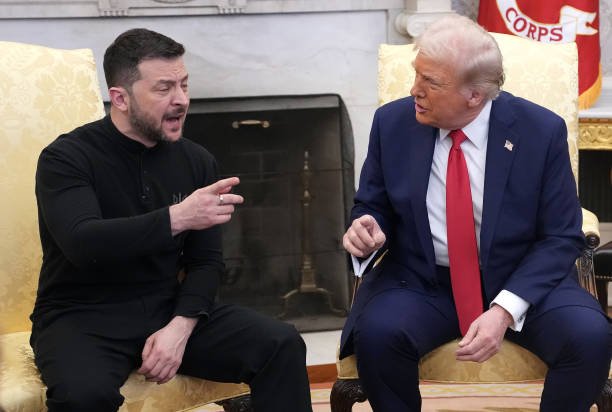Does the US still need presidential debates?
 Signs promoting the debate between US President Joe Biden and his rival Former US President Donald Trump that will take place on June 27, 2024 are seen around the venue at CNN Center in Atlanta, Georgia, US [Megan Varner/Reuters]
Signs promoting the debate between US President Joe Biden and his rival Former US President Donald Trump that will take place on June 27, 2024 are seen around the venue at CNN Center in Atlanta, Georgia, US [Megan Varner/Reuters]
(This article is originally published in the Aljazeera)
By Christopher Rhodes
President Joe Biden and former President Donald Trump recently came to a surprising, though possibly tenuous, agreement to revamp the presidential debate cycle this year. Breaking away from the Commission on Presidential Debates, Biden and Trump will face off on June 27 and September 10 in debates hosted by CNN and ABC, respectively.
Yet a number of people are questioning whether these events are necessary or even useful. Recent presidential debates have rightly been criticised for being poorly managed free-for-all events in which candidates – especially Donald Trump – have run roughshod over moderators while spewing talking points and falsehoods without being fact-checked. While these criticisms are valid, the misgivings among voters for each of these two candidates make the presidential debates a uniquely important opportunity.
Biden and Trump head into this election with unprecedented and growing political baggage: an octogenarian and an autocrat, an alleged enabler of war crimes and a convicted criminal. At the end of the day, both candidates need these debates to attempt to redeem themselves and their candidacies. They will have the chance to defend and comport themselves as they face off with one another and a set of moderators later today and again in September. And for many reluctant or undecided voters, these debates may become particularly pivotal in deciding which candidate to support, even if many view it as an exercise in choosing the least bad option.
Trump, who had started his 2020 re-election campaign almost as soon as he had taken office in 2017, has been relatively quiet publicly in the run-up to this election, outside of Truth Social rants and a few media appearances in front of a New York courthouse during his three-week “hush money” trial. Trump neither testified nor agreed to be extensively interviewed by a neutral reporter in relation to his legal troubles. In fact, during months of litigation, he sat for interviews only with journalists from a few friendly outlets, such as Fox News and Newsmax, who asked him softball questions for pre-taped segments, which were later edited to put him in the best light possible.
Of course, the former president has been making his case at his campaign rallies. Local admirers still turn out for these events, alongside die-hard supporters who follow him around the country like the groupies of an ageing rock star. Trump’s team has been careful to put him in only the most friendly spaces where he can repeat his lies and harangue his adversaries without pushback.
But with the Biden campaign making the most of being able to now refer to Trump as a convicted felon, Trump’s “witch hunt” accusations are no longer as effective as they once were in shaping or at least muddying the discourse around the criminal cases against him. The debates can finally put him on the spot to answer for the many charges against him, and he can ill-afford to pass up the opportunity to try to regain control of the narrative about his legal troubles.
Trump and his team know that he will need to persuade sceptical but potentially sympathetic voters to back him, and they can see that he has not performed well at this task. In May, Trump embarrassingly attempted to gain the support and possibly even the nomination of the Libertarian Party at their own convention. He was mercilessly booed (drowning out the cheers of his supporters who showed up only for his speech) and ended up arguing with the crowd before leaving the stage. And his recent outreach efforts to Black voters have been mocked as transparently staged events with disappointing crowds and little grassroots support.
The former president’s team can’t be happy with these events. Trump being Trump, his instinct is to try to weasel his way out of his promise to debate as he did with his promises to testify – already he’s been making wild demands such as pre-debate drug testing for Joe Biden. But ultimately, if Trump wants to sway any of the fence-sitting voters who will be key to his election chances, the former president cannot afford to skip these showdowns with Biden.
Nor can Biden afford to forego answering pointed questions in a public forum where his record will be under scrutiny. Within his coalition, moderates may care primarily about the economy’s steady but uneven recovery and liberals might pragmatically vote for Biden based on women’s freedoms, LGBTQ rights and preserving democracy from Trump’s authoritarian leanings. But for progressives for whom Gaza has become the defining issue, Biden’s support for Israel could overshadow his domestic achievements.
The memory of Lyndon Johnson remains a cautionary tale for Biden’s team, who undoubtedly know the story of how Vietnam left his chances for a second term in ruins despite the many advances he made on civil rights, and addressing poverty and racial injustice. While Biden hasn’t seen the mass exodus in support that Johnson experienced, dissatisfaction at the margins could be enough to tip the scales in this tight election. Even though November is ages away in political terms, the last few months indicate that the president’s re-election hopes may live or die based on the war in Gaza and how he’s perceived as approaching it.
Thus, for Biden and “his” war in Gaza, as it’s being framed, the debates will be pivotal in two ways.
First, these events will give him an opportunity to attempt to defend his policies. He will likely try to sell the argument that his hand-holding of the Netanyahu government has threaded the needle of supporting the Israeli state while moderating its actions. The debates will also allow Biden the opportunity to compare and contrast his Gaza policy to whatever comments Trump articulates concerning the conflict, which so far have been hawkish but vague.
Second, Biden knowing that he will be put in a spotlight to defend his policies increases the pressure to shift those policies as his efforts to rein in Netanyahu seem increasingly feeble. Biden and his poll watchers are looking at states like Michigan, where 100,000 Democratic voters declared themselves “uncommitted” in the February primary. The Biden team has been ramping up pressure over the past several weeks towards a ceasefire in Gaza. While a breakthrough does not appear to be eminent, Biden would love to be given a positive update during the first debate or even walk into the second debate with a US-brokered ceasefire in hand.
Even with these major issues looming for each candidate, there’s no guarantee that the debates will be a useful venue for giving the American public clarity on these topics. The concern is that Biden will simply stick to his talking points, Trump will bloviate and prevaricate, and neither candidate will be fact-checked in real time. Hopefully, these shortcomings will be addressed through changes to the debate structure, such as the removal of a live audience and the ability of moderators to mute the mics of the candidates if they attempt to talk out of turn or exceed their allocated time.
But even if Biden and Trump can simply push their respective agendas throughout the debates, these events still have utility. Perhaps as important as the candidates’ positions on issues are their physical and mental capacities to be president for the next four years. Age has been a major discussion topic in this race, with the two oldest presidents in American history squaring off yet again. Both campaigns and their surrogates have attempted to paint the opposing candidate as mentally unfit for the office of president, highlighting or even manufacturing gaffes to support these narratives.
The formal presidential debates, rather than stage-managed campaign events or even Biden’s State of the Union address, might provide voters with the best opportunity for judging each candidate’s physical stamina and mental acuity. The debates will certainly provide the only side-by-side comparison of the two men. In an election where each side seeks to rally its ambivalent base members, the candidates can take this opportunity to at least display themselves as competent for the job. A sizeable number of voters will make their 2024 decision not based on enthusiasm but rather harm reduction and a lesser of two evils approach. The head-to-head comparison will be useful in figuring out which candidate they will hold their noses and vote for this fall.
(Dr Christopher Rhodes is a lecturer in Government at Harvard University and lecturer in Social Sciences at Boston University)




Leave Comment